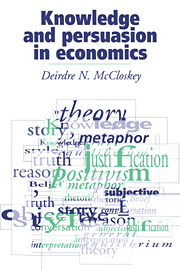Book contents
- Frontmatter
- Contents
- List of figures and tables
- Preface
- Acknowledgments
- Part I Exordium
- Part II Narration
- Part III Division
- Part IV Proof
- Part V Refutation
- 14 The very idea of epistemology
- 15 The tu quoque argument and the claims of rationalism
- 16 Armchair philosophy of economics
- 17 Philosophy of science without epistemology: the Popperians
- 18 Reactionary modernism: the Rosenberg
- 19 Methodologists of economics, big M and small
- 20 Getting “rhetoric”: Mark Blaug and the Eleatic Stranger
- 21 Anti-post-pre-metamodernism: the Coats/McPherson/Friedman
- 22 Splenetic rationalism, Austrian style
- 23 The economists of ideology: Heilbroner, Rossetti, and Mirowski
- 24 Rhetoric as morally radical
- Part VI Peroration
- List of works cited
- Index
24 - Rhetoric as morally radical
Published online by Cambridge University Press: 01 February 2010
- Frontmatter
- Contents
- List of figures and tables
- Preface
- Acknowledgments
- Part I Exordium
- Part II Narration
- Part III Division
- Part IV Proof
- Part V Refutation
- 14 The very idea of epistemology
- 15 The tu quoque argument and the claims of rationalism
- 16 Armchair philosophy of economics
- 17 Philosophy of science without epistemology: the Popperians
- 18 Reactionary modernism: the Rosenberg
- 19 Methodologists of economics, big M and small
- 20 Getting “rhetoric”: Mark Blaug and the Eleatic Stranger
- 21 Anti-post-pre-metamodernism: the Coats/McPherson/Friedman
- 22 Splenetic rationalism, Austrian style
- 23 The economists of ideology: Heilbroner, Rossetti, and Mirowski
- 24 Rhetoric as morally radical
- Part VI Peroration
- List of works cited
- Index
Summary
The Review of Radical Political Economy, the main journal of the small group of Marxist economists in the United States, held a forum on The Rhetoric of Economics in 1987. Of the radical readers many — represented in the forum by the comments of Arjo Klamer and much of those by Hamish Stewart — approve of the book and the later works. They see them as weapons for overturning the more sterile version of neoclassical economics, mathematically speaking, Max U(x,y,z) s.t. y = x + Pz. As a neoclassical I find Max U a more charming fellow than they do, but the work might well be used this way.
Even from a neoclassical point of view the rhetorical overturning might be useful. That mad Max, for all his charming simplicity, is by now getting on people's nerves. The graduate textbooks in economics are littered with his cigarette butts and half-empty cups of coffee. He has reprogrammed the heads of economists for fourth-rate applied mathematics, and too often has erased the first-rate economics. By now it's time to clean up the rubbish and wipe the blackboards, retaining the useful bits from Max's lesson but refixing our attention on the wide world outside.
Hamish Stewart, though, was alarmed by the claim that morality matters in science, calling it a “scary aspect of McCloskey's book.”
- Type
- Chapter
- Information
- Knowledge and Persuasion in Economics , pp. 340 - 364Publisher: Cambridge University PressPrint publication year: 1994



